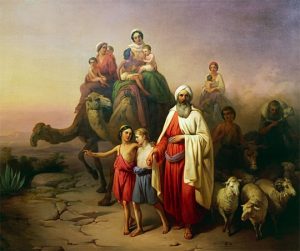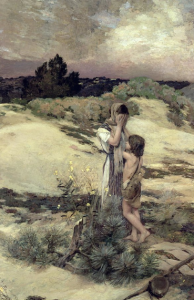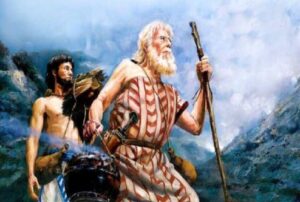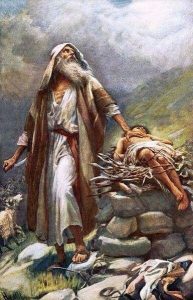Abraham’s Journey of Revelation & Sacrifice
At least nine times in Genesis (see below), God reveals Himself to Abraham in order to provide special revelation about His plan for Abraham and all of mankind. Note that this is “special revelation” – God revealing His person, mind a![]() nd plan to man. General revelation refers to the countless ways God reveals His mind and character through
nd plan to man. General revelation refers to the countless ways God reveals His mind and character through  the natural world and universe we observe and live in (Rom. 1:19-20; Psa. 19:1-4; Job 38). Special revelation became necessary because of sin, which resulted in man no longer being able to have personal fellowship with God. God wanted Man to know that He still loved him and wanted to have a personal relationship with him.
the natural world and universe we observe and live in (Rom. 1:19-20; Psa. 19:1-4; Job 38). Special revelation became necessary because of sin, which resulted in man no longer being able to have personal fellowship with God. God wanted Man to know that He still loved him and wanted to have a personal relationship with him.
That work of Special Revelation led to its fullest and final iteration in Jesus Christ the Living Word and the inspired Written Word of God, the Bible. Today, we have God’s Living and Written Word illuminated for us by the Holy Spirit so that we can understand Him, and understand how we can have fellowship with Him and glorify Him.
In his journeys, Abraham also learned much about sacrifice and its place in his relationship to God. Not only did God reveal to him this appropriate way to show obedience and gratefulness to God, but also how sacrifice can be experienced in the activities of life. Beginning when he first entered the land and stopped in Shechem (just north of Jerusalem), he built an altar to the Lord four different times (Gen. 12:7, Shechem; Gen. 12:8, Bethel; Gen. 13:18, Mamre; Gen. 22:9, Moriah).
Please pause here and open your Bible and read through Genesis 21-22 in one sitting before you continue on through this Bible Study.
 Bible Study Journal
Bible Study Journal
Here is a list of the key revelation events in Abraham’s life where God appeared, communicated and revealed Himself with him. Please stop and take the time to look up each reference (preferably in a “real Bible”, i.e. not a phone app) and write in your Bible Study Journal what you learn from each event.
-
-
-
- 12:1 (Heb.11:8)
- 12:7
- 13:14
- 15
- 17:1-21
- 18
- 21:12-13
- 22:1-2 (James 2:21-23)
- 22:15-18
-
-
-
-
-
- Special Credit: Read Rom. 1:18-32 and note the differences between “general” and “special” revelation.
-
-

Four Seeds of Abraham
God’s covenant promise to Abraham was revealed and clarified through several interactions. Within the Covenant, God promised to bless Abraham with Land, Seed, and Blessing. He defined the Promised Land with its boundaries, and the heathen nations that lived there and were to be conquered. The Blessing was to provide restored fellowship with God, ultimately for all mankind and for eternity, through Jesus Christ the Messiah’s finished work on the Cross. The Seed (leading finally to the Messiah) was constantly threatened (even by Abraham’s compromising decisions) because Satan’s agenda is to crush the Seed – Gen. 3:15 pictures Satan attempting to bruise or bite the Seed’s heel, but God promises to crush Satan’s head. See the final chapters in Revelation to realize how real that promise is.
Abraham’s Seed, which constitutes God’s work of providing the Ultimate Seed of the Messiah, is seen in these four forms (T.Constable):
-
- His Natural Seed
- All the physical descendants of Abraham.
- Gen 12:1-3, 7 (and other texts)
- His Spiritual Seed
- All Jews, believing physical descendants of Abraham, who followed Abraham’s faith in the One True God.
- Rom. 9:6, 8; Gal. 6:16
- Extended Spiritual Seed
- Believing non-physical descendants of Abraham.
- All true believers, whether Jew or Gentile, who believe in God’s promise to send a Redeemer Messiah.
- Gal. 3:6-9, 29
- The Ultimate Seed
- Jesus Christ the Messiah
- The final culmination of Abraham’s progeny (Gal. 3:16).
- His Natural Seed
Genesis 21 – Miracle & Struggle at Home
When Gen. 22:1 says “After these things”, what things are being referred to? There are parallels between Abraham/Isaac and Hagar/Ishmael; the latter aren’t “minor” characters – compare Gen. 16:7-16; 21:8-12, where they are seen as equally significant to God.  Hagar takes Abraham’s first son into the wilderness, where his death seems imminent. It is interesting that these passages describing Abraham’s and Hagar’s prospect of losing their sons, include parallel language, sometimes using the exact same words. Perhaps God inspired Moses to write in this manner to emphasize the tragedy of giving up your own son.
Hagar takes Abraham’s first son into the wilderness, where his death seems imminent. It is interesting that these passages describing Abraham’s and Hagar’s prospect of losing their sons, include parallel language, sometimes using the exact same words. Perhaps God inspired Moses to write in this manner to emphasize the tragedy of giving up your own son.
Hagar is the only person in the Bible to give God a name, “the God Who sees” El-Roi, Gen. 16:13. Was Hagar amazed that God saw her and came to care for her? Also consider her amazement that she was able to see His physical manifestation. Then Gen. 16:11, God gave Ishmael his name, which means “God hears”.
Going further, Abraham’s sacrifice of Isaac has major impact on the Bible’s story. With the birth of Isaac, the promised seed line surfaced, which in turn influences all of the rest of God’s work on behalf of man’s need for rescue from sin. God promised a Seed-bearing son – Gen.17:16; 18:14. Then in Gen. 21:1, God “visited”, He “took note”, “as He had said”, God did what He said He would do.
Genesis 22 – Sacrifice
When God appears to Abraham again in Gen. 22:1, Abraham is ready – “Here I am, Lord” (like young Samuel!), he is saying “I am ready to listen and obey!” Compare Exo. 3:4; 1 Sam. 3:4; Isa. 6:8. God “tests” Abraham – this is not a temptation to sin, but a test to demonstrate Abraham’s love for God and faith in Him. James 2:21-23 explains more to us about testing to prove character & strength.
In Gen. 22:2, God gives the most remarkable command possible, “Take your son, go to Mt. Moriah and offer him as a sacrifice”. Humanly, this is an irrational act involving his 20 year old only son who was to continue God’s promises of the Abrahamic Covenant. This strongly worded instruction, a specific Hebrew phrase used only here & Gen. 12:1, is a link between these two radical tests which underscores their importance. This startling command to Abraham is repeated three times (Gen. 22:2, 12, 16). Perhaps God even has in His mind the final plan that would include Him giving His only Son.
instruction, a specific Hebrew phrase used only here & Gen. 12:1, is a link between these two radical tests which underscores their importance. This startling command to Abraham is repeated three times (Gen. 22:2, 12, 16). Perhaps God even has in His mind the final plan that would include Him giving His only Son.
He and Isaac left three days later for the two day journey from Beersheba to Moriah. This mountain was a special place. “Moriah” can be translated “visions”, “worship”, “high”, “chosen”, “place of appearing” – all which help to express the lofty place the location holds geographically and spiritually. Mt. Moriah is the mountain where David built an altar to God (2 Sam. 24:16-25) , and where Solomon’s Temple was built (2 Chron. 3:1).
This 8th revelation from God is special – His command “take Isaac” is dramatic, it tests/proves/demonstrates the nature and strength of Abraham’s faith. James 2:21-22 comments that this confident faith in God’s provision was the outward actions of his inner heart of faith. Gen. 22:9, is real faith in action. In Abraham’s heart, Isaac’s sacrifice was already settled. Isaac must have learned something about faith from his father; certainly as he walks alongside Abraham in this episode, he watches obedience and faith being lived out. This event was indeed the height of Abraham’s relationship with God.
The Greatest Promise: The Lord will Provide
In Genesis 22:7, as father and son approach Moriah, Isaac asks his father the obvious question – they have almost everything needed in order to make their sacrifice, but what is his father’s plan for a lamb to place on the fire of the altar? Abraham expresses his strong faith in God to provide in verse 8, “God will provide for Himself the lamb”, even as the knife was held tightly in his belt. Note also the strong faith of Isaac as he trusted in his father’s actions to be what God wanted. Abraham has faced sacrifice five times now in his life – leaving Ur, leaving his extended family, leaving Lot, and sending away Ishmael. Now it is Isaac. The long view of Scripture which we have today gives us the perspective which Abraham and Isaac had only by faith – God did indeed provide the sacrifice, not only for their worship that day, but also for the One to come Who would be the sacrifice for the sins of world, the blood of the perfect Lamb of God shed on the Cross. In Gen. 22:14, God inspired Abraham to call that place “Jehovah Jireh – the Lord will provide”.

Abraham was willing to sacrifice his only true son in order to obey God, the sacrifice was already settled in his heart. That faith provided for God’s ability to stay Abraham’s hand, and the angel of the Lord, the very person of God, spoke again in person to Abraham telling him to look over at the tangled bushes where the ram was caught. God gives the promise that He will provide a sacrifice, and along with v13, this is the first picture of one life being given as a substitutionary sacrifice for another life. This points ultimately to the sacrifice of God’s Son on the Cross as our substitute for sin.
Abraham already knew God as “El Shaddai” (Gen. 17:1), the Almighty, All-Sufficient God. Now Abraham knows God more deeply. In Gen. 22:15-16, God appears to Abraham again, the ninth revelation from God to Abraham, and God gives a unique covenant oath, only given to Abraham in which He reiterates the Covenant promise of Land, Seed, and Blessing. Moses refers later to this later (Gen. 26:3; Exo. 13).
In Hebrews 6:13-18, we are reminded of the weight of strong assurance we have in God’s promises. The Creator of the Universe guarantees that His purposes and promises are unchangeable, giving us a grand hope as the “anchor of our soul”. While Resurrection and Atonement are portrayed in this passage, the Key Truth is God’s singular covenant to Provide His fulfilled promises to His faithful followers.
One of the most exciting ways for us to study the Bible is to discover the rich legacy of promises God holds in store for us. Here is a list of just a few verses to consider as we look at God’s promises to Abraham. Read each one carefully, note the highlighted phrase for each, and write in your journal how God is might be producing each promise in your life.
-
- God’s presence— “I will never leave you” (Heb. 13:5)
- God’s protection—”I am your shield” (Gen. 15:1)
- God’s power—”I will strengthen you” (Isa. 41:10)
- God’s provision—”I will help you” (Isa. 41:10)
- God’s leading—”And when He puts forth His own sheep, He goes before them” (John 10:4)
- God’s purposes— “I know the thoughts that I think toward you, says the Lord, thoughts of peace, and not of evil” (Jer. 29:11)
- God’s rest—”Come to Me, all you that labor and are heavy laden, and I will give you rest” (Matt. 11:28)
- God’s cleansing— “If we confess our sins, He is faithful and just to forgive us our sins, and to cleanse us from all unrighteousness” (1 John 1:9)
- God’s goodness— “No good thing will He withhold from them that walk uprightly” (Psalm 84:11)
- God’s faithfulness—”The Lord will not forsake His people for His great name’s sake” (1 Sam. 12:22)
- God’s guidance—”The meek will He guide” (Psalm 25:9)
- God’s wise plan—”All things work together for good to them that love God” (Rom. 8:28)





